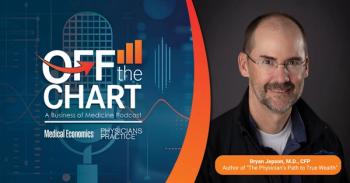
Five Ways to Combat Physician Stress
Consciously deciding to lower your stress is the first step to wellness.
Long hours. Liability concerns. The implications of the Affordable Care Act. Is it any wonder that physicians suffer from anxiety attacks? Indeed, stress among healthcare providers has reached epic proportions. A 2011 survey by Minneapolis-based consulting firm Physician Wellness Services and Cejka Search, a physician recruiting firm in St. Louis, Mo., found that 87 percent of the more than 2,000 physicians surveyed said they felt moderately or severely stressed or burned out every day.
"When patients come to see us they are either sick or hurt or dying, and the decisions we make can actually help or harm them," says Dike Drummond, a former family practice physician who now runs TheHappyMD.com, a burnout prevention website for doctors. "There's a lot at stake and because we are helpers the natural tendency is for healthcare providers to put our own needs last."
Left unchecked, that can lead to emotional fatigue, depersonalization, marital discord, physical illness ? including high blood pressure, depression, panic attacks, and sleep deprivation ? and higher incidences of clinical errors, says Drummond. Thus, it's imperative that physicians develop coping skills, and create a working environment that meets both their personal and professional needs.
1. Put yourself first
That begins with making yourself a priority, says Lori Brostrom, a spokesperson for Physician Wellness Services. "[Physicians] need to exercise, engage in self-care activities, like yoga or Pilates, and take the time to have a healthful meal as opposed to grabbing a candy bar from the machine," she says. When possible, it also helps to leave the office for lunch.
Drummond agrees. "Our work is physically, emotionally, and spiritually draining ? not in the religious context but in terms of our sense of purpose," he says. "We each have our own energetic bank account, so you need to figure out how to make deposits into these accounts by doing things that feed your soul, and recharging yourself when you're not at work." To that end, he says, all physicians (especially the younger ones) should be encouraged to keep their hobbies, maintain an exercise regimen, and spend regular time with loved ones throughout their careers to maintain a healthy work-life balance.
2. Meditate
Training in mindfulness meditation, which teaches physicians to cultivate their attention and awareness skills, can also help alleviate burnout and stress, according to a 2009 study by the University of Rochester Medical Center. The results, which were published in the Journal of the American Medical Association, found that the 70 primary-care doctors who participated in an eight-week course on achieving "mindfulness" through meditation felt less burned out and had greater empathy for patients.
Indeed, says Drummond, professional satisfaction is highly correlated with a physician's capacity to "be present" in their clinical encounters ? or find meaning in their work by relating to their patients on an emotional level, says Drummond. "A lot of things fall under this umbrella, but mindfulness meditation teaches you to recognize what you're feeling in the moment so you can be present with your patients," he says. "You also learn how to recognize stress in yourself and how to put it down, which is really important when you go from the office to home."
3. Demand a culture of wellness
It's equally important to work for a practice that emphasizes a culture of wellness, says Brostrom. Practices with the highest provider satisfaction scores and lowest turnover offer flexible hours, schedules that permit doctors uninterrupted time to focus on patient care or charts, and short breaks during the day to encourage them to eat a healthful meal and switch gears. Some, too, offer classes to help their providers manage their stress ? during a time when the providers can take advantage of them. "It's about making resources available and creating a structure in which the physicians can operate more efficiently, and in a way that reduces stress as much as possible," says Brostrom. But not enough practices put doctors first. When asked if their organizations did anything to help them manage burnout and stress, only 15.7 percent of the respondents to the Physician Wellness Services/Cejka Search survey said yes. If your office does not focus on the health of its providers, it's up to you to create that culture for yourself ? or seek employment elsewhere. "At the end of the day, the physicians need to take ownership for helping themselves," she says.
4. Reach out
One of the reasons stress is rampant in the medical field is that healthcare providers rarely seek help, says D.A. Crockett, founder of Quality West International, a management consulting and executive advisory firm. Those experiencing marital issues, financial challenges, addiction problems, or trauma associated with a negative patient outcome often suffer in silence. "The problem is that physicians and other respected healthcare professionals have a reputation to maintain," says Crockett. "They can't share with their peers because they feel they need to maintain a competent demeanor." But they've got it all wrong, he says. One of the most effective ways to keep stress levels in check is to share your feelings with a trusted friend, family member, or adviser ? someone you can count on to keep your conversation confidential.
5. Manage your schedule
The growing contingent of employed physicians who are foregoing partnership track in exchange for regular hours, and the trend toward part-time providers (driven largely by working women and older physicians), bodes well for the industry overall, says Drummond, noting flexibility is helping doctors regain control over their careers. "Doctors would be well-served by focusing their practice on patients they enjoy the most and by exercising as much control as possible over their schedule," he says. "It's only going to get better as doctors start to have a choice over how many hours they want to work."
While they're in the office, Alan Rosenstein, medical director for Physician Wellness Services, also recommends physicians learn to utilize their time more effectively. That means setting aside specific blocks of time to focus on paperwork or follow up with patients, minimizing the time they spend en route, and shuffling lower-priority tasks to support staff, enabling them to focus on more complex and stimulating patient cases. At the same time, he says, step back to consider how your personal goals and priorities may have changed from earlier in your career, so you know what changes to pursue in the future. Oh, and give that perfectionism a rest. While admirable, ask yourself if perfection is necessary in everything you do, and where you can afford to be more flexible, says Rosenstein.
Physicians do an excellent job of caring for others. But for all their training and education, they often lack the skill set to help themselves. "Our training is an enormously powerful conditioning exercise in which we are programmed to respond to problems and just survive ourselves," says Drummond. "Everything starts to look like a nail and all you've got is a hammer." Those who learn coping skills, he notes, and identify ways to exercise greater control over their careers will be better equipped to keep stress and burnout at bay.
Shelly K. Schwartz, a freelance writer in Maplewood, N.J., has covered personal finance, technology, and healthcare for more than 17 years. Her work has appeared on
This article originally appeared in the October 2012 issue of Physicians Practice.
Newsletter
Optimize your practice with the Physicians Practice newsletter, offering management pearls, leadership tips, and business strategies tailored for practice administrators and physicians of any specialty.






